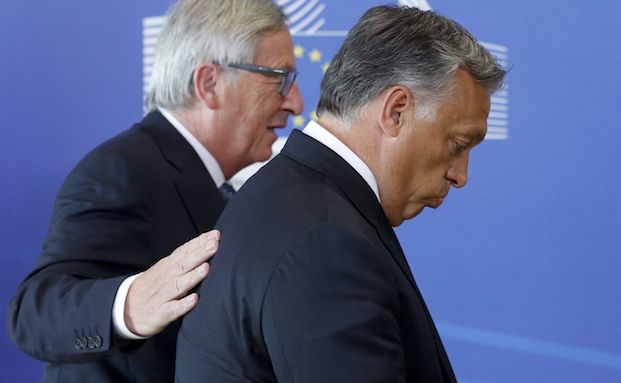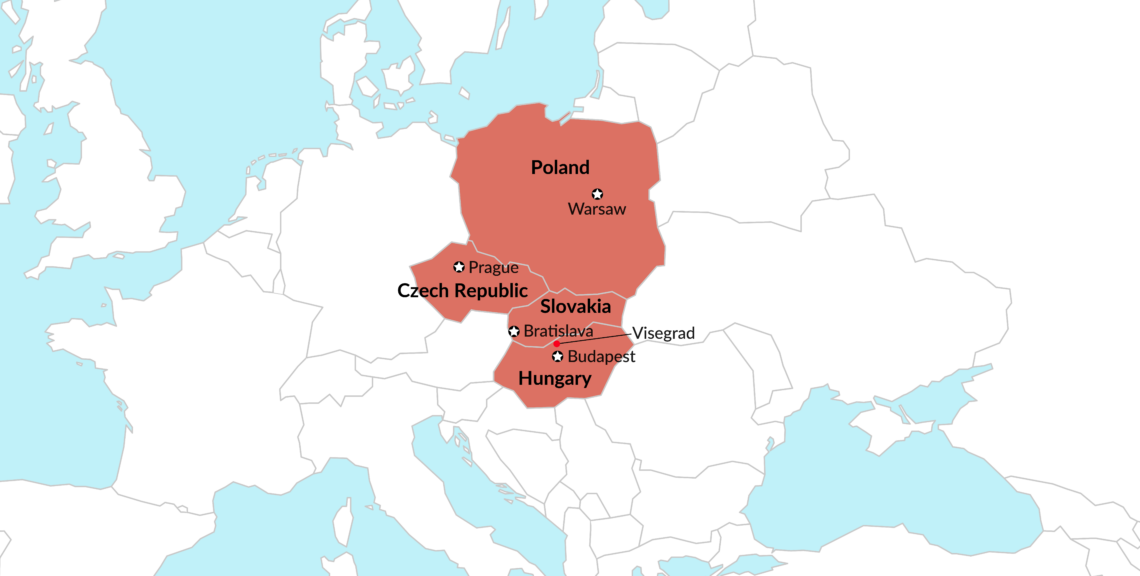Cold war between Visegrad and Brussels
Brussels is angry with Poland, Hungary, the Czech Republic and Slovakia for allegedly lacking solidarity and “EU values.” But the European Commission’s plan to use financial pressure to rein in the four politically conservative Central European members is nearly certain to backfire.

In a nutshell
- Conflicts between the more assertive Central European states and the European Commission are coming to a head
- There is neither a substantive geopolitical fracture nor a profound political philosophy issue that divide the two sides
- Visegrad Group members have a chance to prevail in this political arm wrestling with Brussels only if they stick together
On the first weekend of May 2018, European Commission President Jean-Claude Juncker unveiled a bronze statue of Karl Marx (1818-1883) that had been donated to the German philosopher’s native city of Trier by China’s Communist Party. Immediately, he was accused by politicians in Central Europe of insulting the memory of millions of victims of communism who were killed, imprisoned or expropriated of their property, in the name of the Marxist doctrine.
Only three days before that commemoration, Mr. Junker’s European Commission proposed a Union budget draft for the 2021-27 period. The document proposed a major innovation, which it called conditionality, that would link a member country’s right to receive European Union funding with its observance of the rule of law. The new mechanism would allow the Union to suspend, reduce or restrict access to EU funding for “backlash” member states.
It is a public secret that the scheme is seen as a way to discipline the countries of Central and Eastern Europe, notably Poland and Hungary, and as a form of retaliation against members of the Visegrad Group (which also includes the Czech Republic and Slovakia) for not showing enough “solidarity” during the 2015 migration crisis and in its aftermath.
The very real rift within the EU, between the northern and southern countries, is being deliberately obscured by recreating the old East-West split.
Both developments illustrate the ongoing “cold war” between Brussels and the Visegrad countries. There is neither a substantive geopolitical fracture nor a profound political philosophy issue dividing the two sides. Instead, the crisis is being fed by a different interpretation of the Marxist legacy and a struggle for resources within the Union and the euro area. It seems that the very real rift within the EU, between the northern and southern countries, is being deliberately obscured by recreating the old East-West split. This, the suspicion among easterners goes, would open the way to redirect EU funds from fiscally responsible members in Central and Eastern Europe to the heavily indebted southern states, such as Italy and Greece.
Geopolitical raison d’etre
Cooperation among the Visegrad states was launched in 1991 by President Vaclav Havel of then-Czechoslovakia, Poland’s President Lech Walesa and Hungarian Prime Minister Jozsef Antall. Based on their dissident experiences, the leaders of these three newly liberated countries wanted to rid the region of the instruments of Soviet domination, as well as to obtain Western security guarantees against a resurrection of Russia’s power to subjugate them. A “return to Europe and the West” and “rebuilding capitalism” were slogans of the day.
Throughout much of its history, Central Europe was a periphery of the West and a place where major wars began and ended. European powers clashed there, employing a tactic of “divide and conquer.” Visegrad’s architects wanted to preclude any revival of historic rivalries. They agreed that filling the vacuum between a reunited Germany and the collapsing Soviet Union was in their vital interest.
Facts & figures
The Visegrad Group is made up of four countries in the eastern part of the EU

It was no coincidence that they selected the medieval castle in Visegrad, Hungary for the group’s inauguration. In 1335, Visegrad hosted a congress of Bohemian, Hungarian and Polish kings, who resolved their mutual disagreements to protect the area against territorial claims by the Teutonic Order. They also agreed to establish new commercial routes to bypass Vienna’s staple right (a medieval privilege in which certain cities and ports could require traveling merchants to offer their wares for sale for a specified period before resuming their journey). The castle had also hosted a meeting that helped found Poland’s Jagiellonian dynasty, which shielded Europe from Russian and Ottoman expansion between the 14th and the 16th centuries.
The Visegrad Group has proven its usefulness more than once. Most importantly, it paved the way for its members to join NATO by persuading the United States of the need to fill the vacuum in Central Europe. What impressed U.S. officials the most was this display of regional cohesiveness. Secondly, Central European countries had already agreed to liberalize mutual trade in 1993, well before their entry into the EU in 2004. Finally, the Visegrad Group provided a voice of cold reason during the most chaotic period of the migration crisis, helping convince the EU of the need to protect its borders.
Visegrad-EU conflict
However, the migration crisis also marked a turning point in the relationship between Visegrad and the rest of the EU. The uncontrolled inflow of Muslim migrants and German Chancellor Angela Merkel’s early “Willkommen” policy response, which was introduced without any consultation, had a huge impact on domestic policies in Central Europe. It contributed to the electoral triumphs of euroskeptics: Jaroslaw Kaczynski in Poland (the party he leads took power in 2015), Robert Fico in Slovakia (returned as prime minister 2016, resigned in 2018), Andrej Babis in the Czech Republic (elected prime minister in 2017) and Viktor Orban in Hungary (reelected prime minister in 2018).
We have a case of very subjective criteria defining a dubious problem, with an evident double standard being applied.
In September 2015, the European Council voted down (in a very nonstandard procedure) Central and Eastern Europe’s opposition to a policy of assigning mandatory relocation quotas for immigrants to member countries. The Visegrad 4 refused to surrender, their leaders arguing that the scheme would not work. The current numbers seem to confirm that judgment: out of 120,000 refugees qualified for relocation from Italy and Greece, only 31,000 have been relocated elsewhere in the EU.
Still, the Visegrad countries’ image was damaged in Brussels and the European Commission moved into action. First, in June 2017, it launched infringement procedures against the Czech Republic, Hungary and Poland for not complying with their relocation quotas. Secondly, in December 2017, the Commission triggered a procedure against Poland according to Article 7 of the Lisbon Treaty, due to concerns about that country’s judiciary reform.
Article 7 is regarded as a “nuclear option” and has never been invoked before. Its sanction mechanism, which may lead to the suspension of the country’s voting rights in the EU, requires a unanimous vote by the European Council to take effect. Finally, the Juncker Commission proposed a new EU budget plan linking funding with the rule of law. It wants this tool because member states have shown themselves to be reluctant to sanction one another. Under the proposal, the Commission would decide on whether to suspend funds or not, with only a qualified majority of EU member states being able to overturn such a decision.
Double standard
Nobody would object if the Commission were proposing measures to better protect EU finances from fraud or corruption. But here we have a case of very subjective criteria defining a dubious problem, with an evident double standard being applied. For example, there were similar concerns raised over earlier judiciary reforms in Hungary, but the Commission’s approach was noticeably softer in comparison to its stance toward Poland. Why? Hungary’s Fidesz belongs to the European People’s Party (EPP), the biggest political group in the European Parliament, which needs to hold on to the 12 votes of its Hungarian members. On the other hand, the governing Polish Law and Justice Party (PiS) sits in the opposition, with the British Conservatives.
The double standard is even more flagrant when one compares the Commission’s attitude toward Visegrad with that toward the rest of the EU. While the authorities in Brussels proceeded with infringement procedures against Hungary for its asylum legislation, they remained silent when the French parliament passed a very similar law.
‘Feeding rack’
Visegrad countries have received some 150 billion euros in net subsidies from the EU budget since 2007. The rest of the EU may think that, as recipients of such a largesse, these countries are demonstrating a dismaying lack of solidarity and gratitude now that the road is getting rough. However, from Visegrad’s perspective, events can be interpreted in a different way. Mainly due to low labor costs, the West is enjoying a pretty high rate of return on private investments in Central Europe.
According to the economist Thomas Piketty, the flow of corporate profits repatriated from Central Europe to the West far exceed public transfers going in the other direction. Let us take the Czech Republic as an example. According to Eurostat, the annual outflow of profits and property income represented on average 7.6 percent of the Czech gross domestic product between 2010 and 2016, while the annual net transfers from the EU stood only at 1.9 percent of GDP. Czech economist Karel Kriz argues that Central Europe has served as a “feeding rack” for the EU.
The problem cannot be reduced to financial transfers alone. Disagreements also stem from diverging cultures and policies. The Visegrad countries may believe that the present-day EU is different from the group they joined in 2004. Its economic, social and environmental policies are more interventionist. The word “liberal” has completely changed its meaning. Brussels’ agenda is dominated by a neo-Marxist social progressivism that aims to make every individual happy, even as their sense of community evaporates. Viktor Orban’s well-known proclamation of “illiberal” democracy occurred exactly against this backdrop. In 2016, Messrs. Kaczynski and Orban pledged to wage a “cultural counterreformation” to reform a post-Brexit EU, but so far, they stand alone. Conservatives are an endangered species in today’s Western Europe, with the notable exception of Bavaria’s Christian Social Union, or CSU.
One may doubt Visegrad’s long-term ability to stay united in every political fight within the EU.
In this context, the governing parties of the Visegrad Group stand out. Poland’s PiS is a Christian conservative party, while Fidesz (Hungarian Civic Alliance) is a national conservative catch-all party. Slovakia’s Smer-SD (Direction – Social Democracy) in fact mixes socialism with private business. And the Czech ANO (Action of Dissatisfied Citizens), led by the charismatic oligarch Andrej Babis, is a one-man show. But all these parties have something in common: they attract conservatives from the countryside. In the words of British commentator David Goodhart, their voters come from “somewhere” rather than from “anywhere.” They are localists, not globalists. They live on the periphery, not in the center. The Western mainstream labels their representatives as populists, but their populism is not without merit. It can be defined as an illiberal democratic response to the undemocratic liberalism of elites.
Scenarios
To sum things up, Visegrad leaders, different as they may be, have a common interest to pursue their agenda as a voice of reason within the current EU. They could play hardball and they may use the veto power in budgetary negotiations. However, one may doubt Visegrad’s long-term ability to stay united in every political fight within the EU.
Each member’s economic relationship with the Union is different. Slovakia, a member of the eurozone, envisions itself as a part of the core EU. Czechs are mostly euroskeptic, but Prime Minister Babis, who is accused of misusing EU funds, wants to avoid conflicts with German or French leaders that might harm his private business interests. The Polish and Hungarian leaders stand united by ideas, but they are competing for EU resources and may put financial interests ahead of mutual solidarity. (This already happened in March 2017, when European Council President Donald Tusk, a former Polish prime minister and Mr. Kaczynski’s longtime rival, was reconfirmed by a 27-1 vote, with Hungary siding with the majority against Poland.)
Brussels and the major EU powers will certainly try to exploit those differences. However, the Visegrad countries have reasons to play their cards confidently. First, the economic data on trade and investment flows argue in their favor, making the opportunity to blackmail them with EU funds rather limited. Second, the rest of the EU member states are far from united in their efforts. With the United Kingdom leaving, the Franco-German axis is unbalanced and the possible entry of French President Emmanuel Macron’s political party into the European parliament may cause a redistribution of power among its major blocs.
And third, Central Europe can look for inspiration in history. In the 19th century, for example, the Hungarians successfully challenged the imperial court in Vienna, finally achieving the Austro-Hungarian Compromise of 1867. The governments in Warsaw, Budapest and other Central Europe capitals have an opportunity to test their strength and influence within the EU in a similar way. For centuries, Central Europe’s curse was to be a periphery of the West. Now the region has a chance to demand a place closer to the center.








